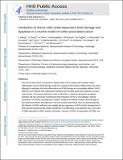Interleukin-22 drives nitric oxide-dependent DNA damage and dysplasia in a murine model of colitis-associated cancer
Author(s)
Conaway, E A; Short, S P; Williams, C S; Horwitz, B H; Wang, Chuanwu; Gong, Guanyu; Sheh, Alexander; Muthupalani, Sureshkumar; Bryant, Erin; Puglisi, Dylan A; Holcombe, Hilda R; Parry, Nicola; Bakthavatchalu, Vasudevan; Wogan, Gerald N; Tannenbaum, Steven R; Fox, James G; ... Show more Show less
Downloadnihms-840612.pdf (3.348Mb)
OPEN_ACCESS_POLICY
Open Access Policy
Creative Commons Attribution-Noncommercial-Share Alike
Terms of use
Metadata
Show full item recordAbstract
The risk of colon cancer is increased in patients with Crohn's disease and ulcerative colitis. Inflammation-induced DNA damage could be an important link between inflammation and cancer, although the pathways that link inflammation and DNA damage are incompletely defined. RAG2-deficient mice infected with Helicobacter hepaticus (Hh) develop colitis that progresses to lower bowel cancer. This process depends on nitric oxide (NO), a molecule with known mutagenic potential. We have previously hypothesized that production of NO by macrophages could be essential for Hh-driven carcinogenesis, however, whether Hh infection induces DNA damage in this model and whether this depends on NO has not been determined. Here we demonstrate that Hh infection of RAG2-deficient mice rapidly induces expression of iNOS and the development of DNA double-stranded breaks (DSBs) specifically in proliferating crypt epithelial cells. Generation of DSBs depended on iNOS activity, and further, induction of iNOS, the generation of DSBs, and the subsequent development of dysplasia were inhibited by depletion of the Hh-induced cytokine IL-22. These results demonstrate a strong association between Hh-induced DNA damage and the development of dysplasia, and further suggest that IL-22-dependent induction of iNOS within crypt epithelial cells rather than macrophages is a driving force in this process.
Date issued
2017-02Department
Massachusetts Institute of Technology. Department of Biological Engineering; Massachusetts Institute of Technology. Department of Chemistry; Massachusetts Institute of Technology. Division of Comparative MedicineJournal
Mucosal Immunology
Publisher
Springer Nature
Citation
Wang, C, G Gong, A Sheh, S Muthupalani, E M Bryant, D A Puglisi, H Holcombe, et al. “Interleukin-22 Drives Nitric Oxide-Dependent DNA Damage and Dysplasia in a Murine Model of Colitis-Associated Cancer.” Mucosal Immunology 10, no. 6 (February 15, 2017): 1504–1517.
Version: Author's final manuscript
ISSN
1933-0219
1935-3456